复习NO开头词汇(一)讲义
- 格式:doc
- 大小:91.01 KB
- 文档页数:9
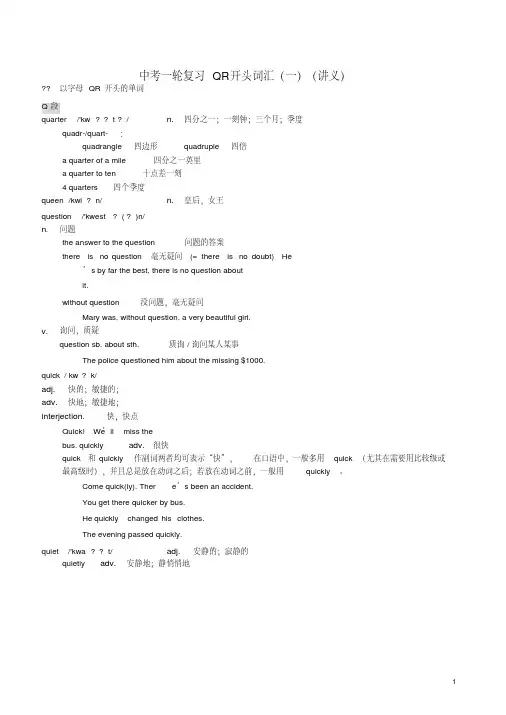
中考一轮复习QR 开头词汇(一)(讲义)??以字母 QR 开头的单词Q 段quarter /'kw??t?/ n. 四分之一;一刻钟;三个月;季度quadr-/quart-:quadrangle 四边形quadruple 四倍a quarter of a mile 四分之一英里a quarter to ten 十点差一刻4 quarters 四个季度queen /kwi?n/ n. 皇后,女王question /'kwest?(?)n/n. 问题the answer to the question 问题的答案there is no question 毫无疑问(= there is no doubt) He’s by far the best, there is no question aboutit.without question 没问题,毫无疑问Mary was, without question, a very beautiful girl.v. 询问,质疑question sb. about sth. 质询/询问某人某事The police questioned him about the missing $1000.quick/ kw?k/adj. 快的;敏捷的;adv. 快地;敏捷地;interjection. 快,快点Quick! We’ll miss thebus. quickly adv. 很快quick 和quickly 作副词两者均可表示“快”,在口语中,一般多用 quick(尤其在需要用比较级或最高级时),并且总是放在动词之后;若放在动词之前,一般用 quickly。
Come quick(ly). Ther e’s been an accident.You get there quicker by bus.He quickly changed his clothes.The evening passed quickly.quiet /'kwa??t/ adj. 安静的;寂静的quietly adv. 安静地;静悄悄地1。

上教版必修2U11. account /əˈkaʊnt/n.描述;表达;报告;账户;v. 解释accountn. 会计accountantopen/close an accountYou’ll find no better account of the British Empire at its peak than the opening chapters of Manchester’s Visions of Glory, volume one of his The Last Lion. <2021年嘉定区二模阅读理解A篇>你会发现,没有比?最后的狮子?(the Last Lion)的第一卷?曼彻斯特的荣耀愿景?(Manchester 's Visions of Glory)更能描述鼎盛时期的大英帝国了。
2. adapt/əˈdæpt/v.改编;改写使适应,使适合〔新用途、新情况〕n. 改编adaptationFrankenstein was a book by Mary Shelly, which has been adapted for the screen dozens of times. <2021年普陀区二模阅读理解A篇>?弗兰肯斯坦?是玛丽·雪莉(Mary Shelly) 的一本书,该书已被改编并搬上银屏数十次。
3.attempt/əˈtempt/n.企图;试图;尝试v.努力;尝试;试图make an attemptyBetween 2006 and 2021, around two thirds of climbers were successful in their attempt to reach the top of Mount Everest. <2021年徐汇区一模阅读理解B篇>2006年至2021年间,约有三分之二的登山者成功登顶珠峰。
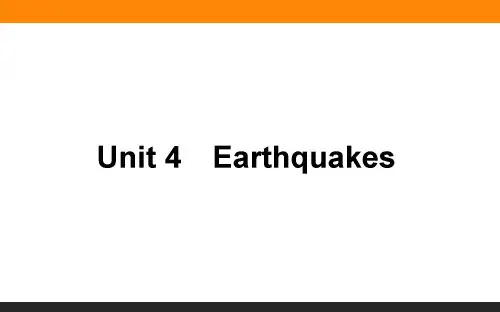

中考一轮复习NO开头词汇(一)(讲义)❤❤以字母NO开头的单词name /neɪm/n. 名字,姓名,名称名字:first name=given name姓:last name=family name全名:full namev.命名They named/called the child Dick.The child named Dick is my brother.nation /'neɪʃ(ə)n/ n.国家;民族;国民national /'næʃ(ə)n(ə)l/ adj. 国家的,全国性的,民族的the national flag 国旗National Day 国庆节May Day 五一劳动节Mother’s Day 母亲节Children’s Day 儿童节the Spring Festival 春节the Dragon-Boat Festival 端午节Thanksgiving Day 感恩节Christmas 圣诞节Halloween 万圣节Easter 复活节nature /'neɪtʃə/ n. 自然,性质,种类natural /'nætʃ(ə)r(ə)l/ adj. 自然的near /nɪə/adv./prep. 接近(地);靠近(地);离…很近(地)His retirement was drawing near.I’d like to sit near a window, please.It is near to my college.adj. (距离)近的,接近的;相似的,近似的the nearest townnearby /'nɪəbaɪ/adj.附近的(仅用于名词前)Lucy was staying in the nearby town of Hamilton.adv.在附近;附近(also near by)I noticed a policeman standing nearby.nearly /'nɪəlɪ/ adv. 将近,几乎近义词:almostThe bottle is nearly empty. 这个瓶子差不多空了。

中考一轮复习 S(一)开头词汇(一)(讲义)❤❤以字母 S 开头的单词名词square /skweə/ n. 广场;平方;正方形Tian’anmen Square天安门广场The Sahara is about 9,600,000 square kilometers in size.street /striːt/ n. 街,街道on/in the street 在街上street people (城市)无家可归者streetlight/streetlamp 路灯supermarket /'suːpəmɑːkɪt/ n. 超市superhero /'suːpəhɪərəʊ/ n. 超级英雄复数:superheroesstore /stɔː/n. 商店v. 储藏,存储You can store coffee beans in the freezer.shop /ʃɒp/n. 商店;制造厂;修配店v. 购物go shopping 或 do some / the shopping 购物shopping center / mall 购物中心stairs /sterz/ n. 楼梯She always runs up / down the stairs. 她总是跑着上下楼。
upstairs / downstairsn. [sing.] 楼上/楼下(尤指地面的一层) the downstairsadj. 楼上的/楼下的an upstairs roomadv. 在楼上,往楼上;在楼下,往楼下live downstairs rush downstairsstep /step/n. 脚步;台阶step by step 逐步地v. 走;跨步;踩;踏She stepped backwards and fell over a chair. 她向后退,撞到并摔倒在椅子上。
shelf /ʃelf/ n. (pl. shelves)架子;搁板steel /stiːl/ n.钢铁;钢 [U]sort /sɔːt/v. 把……分类,拣选n. 种类;类别all sorts of…= all kinds of…各种各样的sort of 有几分,有点 (= kind of)I feel sort of sick. 我觉的有点儿恶心。
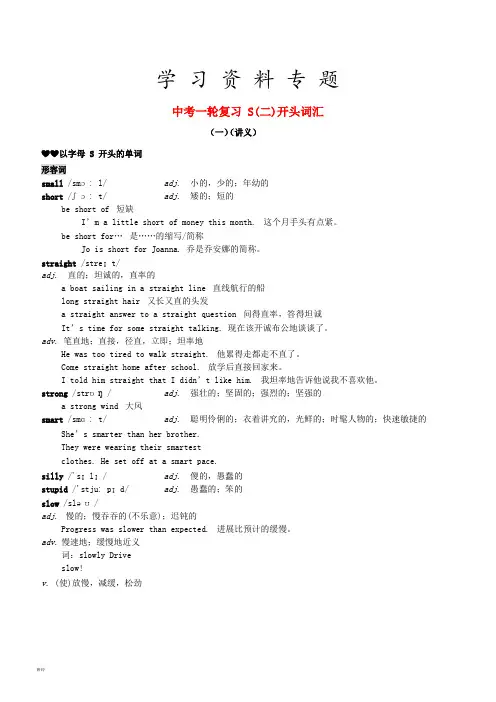
学习资料专题中考一轮复习 S(二)开头词汇(一)(讲义)❤❤以字母 S 开头的单词形容词small /smɔːl/ adj. 小的,少的;年幼的short /ʃɔːt/ adj. 矮的;短的be short of 短缺I’m a little short of money this month.这个月手头有点紧。
be short for…是……的缩写/简称Jo is short for Joanna. 乔是乔安娜的简称。
straight /streɪt/adj. 直的;坦诚的,直率的a boat sailing in a straight line 直线航行的船long straight hair 又长又直的头发a straight answer to a straight question 问得直率,答得坦诚It’s time for some straight talking. 现在该开诚布公地谈谈了。
adv. 笔直地;直接,径直,立即;坦率地He was too tired to walk straight. 他累得走都走不直了。
Come straight home after school. 放学后直接回家来。
I told him straight that I didn’t like him.我坦率地告诉他说我不喜欢他。
strong /strɒŋ/ adj. 强壮的;坚固的;强烈的;坚强的a strong wind 大风smart /smɑːt/ adj. 聪明伶俐的;衣着讲究的,光鲜的;时髦人物的;快速敏捷的She’s smarter than her brother.They were wearing their smartestclothes. He set off at a smart pace.silly /'sɪlɪ/ adj. 傻的,愚蠢的stupid /'stjuːpɪd/ adj. 愚蠢的;笨的slow /sləʊ/adj. 慢的;慢吞吞的(不乐意);迟钝的Progress was slower than expected. 进展比预计的缓慢。
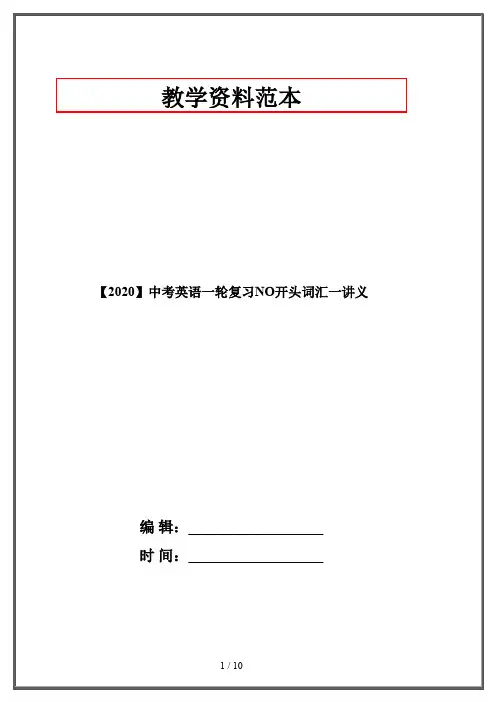
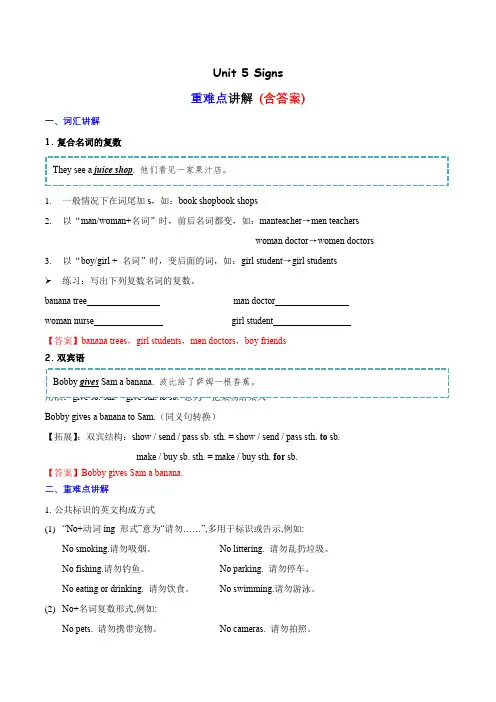
Unit 5 Signs重难点讲解 (含答案)一、词汇讲解1. 复合名词的复数1. 一般情况下在词尾加s,如:book shopbook shops2. 以“man/woman+名词”时,前后名词都变,如:manteacher →men teacherswoman doctor →women doctors3. 以“boy/girl + 名词”时,变后面的词,如:girl student →girl students➢ 练习:写出下列复数名词的复数。
banana tree man doctor woman nurse girl student【答案】banana trees ,girl students ,men doctors ,boy friends2. 双宾语Bobby gives a banana to Sam.(同义句转换)【拓展】:双宾结构:show / send / pass sb. sth. = show / send / pass sth. to sb.make / buy sb. sth. = make / buy sth. for sb.【答案】Bobby gives Sam a banana.二、重难点讲解1. 公共标识的英文构成方式(1) “No+动词ing 形式”意为“请勿……”,多用于标识或告示,例如:No smoking.请勿吸烟。
No littering. 请勿乱扔垃圾。
No fishing.请勿钓鱼。
No parking. 请勿停车。
No eating or drinking. 请勿饮食。
No swimming.请勿游泳。
(2) No+名词复数形式,例如:No pets. 请勿携带宠物。
No cameras. 请勿拍照。
(3)名词或名词短语,例如:Danger! 危险!(4)肯定祈使句,例如:Be quiet!保持安静!(5)否定祈使句:Do not+动词原形,例如:Do not touch. 请勿触摸。

高一英语上第1次课教学目标:1.掌握unit1重点词组及词汇2.掌握直接引语变间接引语(一)3.综合训练—阅读理解一、词汇记忆①单词听写:1. upset 不安的2. loose 松的,松开的3. thunder 雷声,打雷4. power 能力,能量,权利5. dusty 积满灰尘的6. settle 安家,定居,使定居7. highway 公路,大路8. pack 捆扎,包装,打包行李9. overcoat 大衣,外套10. exactly 确实如此,正是11. grateful 感激的,表示感谢的12. tip 提示;技巧;小费②词组听写:1. add up 合计2. be concerned about 关心,挂念3. a series of 一连串,一系列,一套4. at dusk 在黄昏时刻5. no longer /not…any more 不再…6. get/be tired of 对……厌烦7. fall in love with 相爱,爱上8. calm……down 使平静下来9. go through 经历,经受10. on purpose 故意11. face to face 面对面地12. set down 记下,放下13. in order to 为了……14. suffer from 遭受,患病15. join in 参加,加入16. get along with 与……相处,进展二、直接引语和间接引语(一)复习宾语从句宾语从句三要素:语序、连接词、时态。
1、语序:陈述句语序2、连接词:①陈述句用that引导;②一般疑问句用if/whether引导;③特殊疑问句用特殊疑问词引导3、时态:①主句用过去时,从句用与过去相对应的时态;②主句是一般现在时,从句可根据实际情况用任何时态;③表示客观真理时用一般现在时;(二)直接引语和间接引语的概念:当我们用引号引出别人的原话时,被引用的部分称为直接引语,如:The boy said ,"I can speak English very well.”当我们间接地把别人的意思转述出来时,被转述的部分称为间接引语,如:Mary said that Tom had worked there before.由宾语从句我们知道,直接引语转为间接引语之后即为一个宾语从句,因此,直接引语变为间接引语时,人称、时态、引导词、状语和语序都会发生变化。
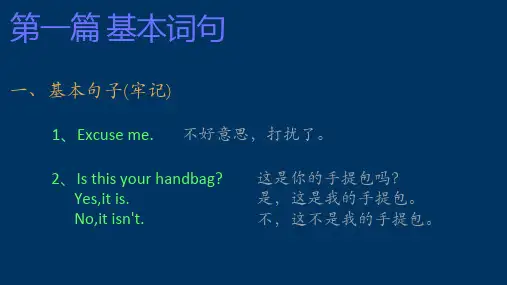

Unit 1 Friendship1.upset(adj.) 心烦意乱的;不安的;不适的(vt.) 使不安;使心烦2.ignore(vt.) 不理睬;忽视3.calm(vt.& vi.) (使)平静;(使)镇定(adj.) 平静的;镇静的;沉着的4.concern(vt.) (使)担忧;涉及;关系到(n.) 担心;关注;(利害)关系5.settle(vt.) 使定居;安排;解决(vi.) 安家;定居;停留6.suffer(vt.& vi.) 遭受;忍受;经历7.recover(vi.& vt.) 痊愈;恢复;重新获得8.pack(vi.& vt.) 捆扎;包装;打包行李(n.) 小包;包裹9.teenager(n.) 十几岁的青少年10.grateful(adj.) 感激的;表示谢意的11.outdoors(adv.)在户外;在野外→indoors(adv.)在室内,在户内12.entire(adj.)整个的;完全的;全部的→e ntirely(adv.)完全地;全然地;整个地13.exactly(adv.)确实如此;正是;确切地→exact (adj).确切的;精确的14.power(n.)能力;力量;权力→powerful(adj.)强大的;强有力的→powerless(adj.)无力的;没有能力的;无权力的15.disagree(vi.)不同意→disagreement(n.)不同意;不一致1.add_up 合计2.calm_down 平静下来;镇定下来3.be_concerned_about 关心;挂念4.go_through 经历;经受5.set_down 放下;记下;登记6.on_purpose 故意7.at_dusk 在黄昏时刻8.a_series_of 一连串的;一系列;一套9.face_to_face 面对面地10.suffer_from 遭受;患病11.pack_(sth.)_up 将(东西)装箱打包12.fall_in_love_with 与……相爱13.get/be_tired_of 对……厌烦14.get_along_with 与……相处;进展1.While walking the dog,you were careless and it got loose and was hit by a car.在遛狗的时候,你不小心松了手,结果狗被一辆汽车撞了。
学员编号:年级:高三课时数:学员姓名:辅导科目:英语学科教师:授课类型代词授课日期及时段教学内容考点解读1、思维导图形式先呈现整体框架概念及分类'人称代词:主格、宾格物主代词:形容词性物主代词、名词性物主代词反身代词疑问代词it it/one代词彳指示代词(重点)<〔that/thosee every/each不定代词(重点)n nothing/nobody/noneL (the)other/others/another;相互代词2、重难点(讲解)重难点一:it与one的用法1.it的用法a.it不仅可指代某样东西,还可指代人(专指未知性别的人,如婴儿,门外敲门者或电话另一端未明确身份的人等。
)例如:Is it a boy or a girl? It's a girl.Someone is ringing the doorbell. Go and see who it is.b.it可指代时间、季节、地点、天气、距离、金钱等。
例如:I hope it is spring all the year round.It is no far from the school to my home.c.it用作形式主语或形式宾语。
例如:It is certain that food prices are going up.She soon found it possible to go to the fitness club regularly.2.one的用法one是不定代词,可代替前面出现的某个可数名词,复数为ones。
例如:I would like to have a digital camera, but I can 't afford one.There are only hard chocolates left; we ve eaten all the soft ones.重难点二:that与those的用法that替代被限定的、有定语修饰的名词;that可替代可数名词单数或不可数名词,指代可数名词复数时用those。
中考一轮复习NO开头词汇(二)(讲义)❤❤以字母 NO 开头的单词object /'ɒbdʒɪkt/n. 物体;宾语;目标v. 反对object to doing sth. 反对做某事She objects to buying a car.ocean /'əʊʃ(ə)n/ n. 海洋o’clock/ə'klɒk/ n. (表示整点)点钟of /ɒv/ prep. (表示所属、数量、其中)……的 the windows of the classroom 教室的窗户a friend of mine 我的一个朋友of course 当然off /ɒf/prep. 离开,脱离,(走)开adv. 离开;(水、电)停了,中断break off 中断fall off 跌落;下降takeoff 脱掉;起飞see off送行;送别get off 下车put off 推迟turn off 关掉set off 出发offer / 'ɒfə/n. 出价,提议,意图a special offer 特价on offer 降价v. 主动提供;建议,提议offer to do 主动提出做某事The kids offered to do the dishes.offer sb. sth. / offer sth. to sb. 提供某物给某人Thank you for offering me help. offer& give & provideShe offered me a pen. = She offered a pen to me.She gave me a pen. = She gave a pen to me.She provided me with a pen. = She provided a pen for me.office /'ɒfɪs/ n. 办公室officer /'ɒfɪsə/ n. 军官;公务员,官员;警察often /'ɒf(tə)n/ adv. 经常,常常频率副词放在 be 动词、情态动词及第一个助动词之后,实义动词之前。
中考一轮复习W开头词汇(一)(讲义)❤❤以字母W开头的单词wait /weɪt/v. 等候;等待wait for… 等候…Who are you waiting for?wait for sb。
todo sth. 期待某人做某事He’s waiting for me tomakea mistake。
can’t waitto do sth。
迫不及待做某事wait aminute/moment/second 稍等一下;等一会儿n. 等候;等待;等待的时间We had alongwait for the bus.We then faced a six-month waitforthe results to arrive。
wake /weɪk/ v. (waked; waked 或 woke;woken) 醒来;唤醒,弄醒wake up 醒来;唤醒James usually wakesup early。
I'll wake you upwhen it's time to leave。
walk/wɔːk/v。
走,步行;散步I walk to school。
= I go to school on foot.walk into (意外地)撞着Hewasn’t looking around and walked straight intoatree。
n. 步行;散步The officeis tenminutes’ walk from here。
Let’sgo for a walk.wall /wɔːl/n。
墙the Great Wall 长城want /wɒnt/v。
想,想要;需要want (sb.) to dosth。
想要(某人)做某事Do you want me tohelp?war/wɔː/ﻩn。
战争,内战;战争时期;斗争World War II = the Second World WarHowlong have theybeen at war?Germanyhas been at peace withFrance for 50years。
词汇积累——英语易混词辨析1. after, in这两个介词都可以表示“……(时间)以后”的意思。
after以过去为起点,表示过去一段时间之后,常用于过去时态的句子中。
如:She went after three days.她是三天以后走的。
in以现在为起点,表将来一段时间以后,常用于将来时态的句子中。
如:She will go in three days.她三天以后要走。
2. how long, how often, how soonhow long指“多长时间”,主要用来对一段时间(如three days, four weeks等)提问。
如:How long ago was it?这是多久前的事了?how often指“每隔多久”,主要用来对频率副词或状语(如once a week等)提问。
如:— How often does he come here?— Once a month.——他(每隔)多久来一次?——每月一次。
how soon指“再过多久”,主要用来对表示将来的一段时间(in an hour, in two weeks等)提问。
如:How soon can you come?你多快能赶来?3. few, a few, little, a little, several, somefew和little的意思是否定的,表示“很少”或“几乎没有”;而a few和a little的意思是肯定的,表示“有一些,有一点儿”。
few和a few修饰可数名词;little和a little修饰不可数名词。
several用于修饰可数名词,语意比a few和some更肯定,含有“好几个”的意思。
some可修饰可数名词,也可修饰不可数名词,从数量上说,它有时相当于a few 或a little,有时指更多一些的数量。
4. the other, anotherthe other指两个人或事物中的“另一个”,表示特指。
中考一轮复习F开头词汇〔一〕〔讲义〕❤❤以字母 F 开头的单词face /feɪs/n. 脸face to face 面对面in the face of…面对(问题、困难等)v.面向;面对You should try your best when you face the difficulty.fact /fækt/ n. 事实,现实in fact = actually adv. 事实上factory /'fækt(ə)rɪ/n. 工厂复数:factories plant 也可以表示“工厂〞 [C]fail /feɪl/v. 失败;不及格;衰退;使绝望,有负于Though he may fail, he will try. (失败)Sometimes he was absent from classes and he failed his examinations. (不及格) pass the examI lost the game, Dad. I failed my team. (有负于;辜负)fail to do sth. 未能做某事He failed to keep the appointment. 他未履约。
Never fail to be thankful to the people around you.永不要忘记感谢你身边的人。
failure n. 失败success (n.)fair /feə/adj. 公平的,合理的It’s fair to do sth.be fair to sb. 对某人公平反义词:unfairfairness n. 公正性;合理性n. 展览会;交易会What did you see at the art and science fair?fall /fɔːl/v. (fell, fallen) 落(下),降落;倒下fallen adj. 倒下的;落下的These houses fell down in the earthquake. 这些房子在地震中倒塌了。
no用法归纳大全好嘞,以下是为您创作的关于“no 用法归纳大全”的内容:咱们在学习英语的时候,“no”这个词可是经常出现呢!今天咱们就来好好聊聊它的各种用法。
先来说说“no”作形容词的用法。
比如说,“There is no water in the bottle”(瓶子里没有水。
)这里的“no”就表示“没有”,直接修饰名词“water”。
“no”还能用作副词。
像“He has no money”(他没有钱。
)这里的“no”其实是用来修饰动词“has”,强调“没有”这个状态。
再看这一句,“No smoking!”(禁止吸烟!)这时候,“no”就起到了禁止、不许的作用。
我记得有一次,我在公园里散步,看到一个牌子上写着“No littering”(禁止乱扔垃圾。
)当时我就想,这个“no”用得可真恰当,简单明了地告诉大家不能乱扔垃圾。
咱们接着说,“no”还能用于回答一般疑问句,表示否定回答。
比如说,“Do you have a pen? No, I don't”(你有一支笔吗?不,我没有。
)还有哦,“no”和名词一起构成复合名词,比如“no one”(没有人)、“nobody”(没有人)。
说到这儿,我想起之前给学生们讲这部分内容的时候,有个学生特别可爱,他总是把“no one”和“none”弄混。
我就耐心地给他解释,“no one”侧重于指人,而“none”既可以指人也可以指物。
“no”也能用来表示“并非;一点也不”。
比如“He is no fool”(他一点也不傻。
)在日常交流中,“no”的用法可真是无处不在。
比如在商店里,你问售货员有没有某样东西,售货员可能就会回答“No, we don't have it”(不,我们没有。
)总之,“no”这个小小的单词,却有着大大的作用。
大家在学习和使用的时候,一定要注意根据具体的语境来准确理解和运用它。
希望今天的归纳能让大家对“no”的用法更加清楚,以后在英语学习中能更加得心应手!。
中考一轮复习NO开头词汇(一)(讲义)❤❤以字母 NO 开头的单词name /neɪm/n. 名字,姓名,名称名字:first name=given name 姓:last name=family name 全名:full namev. 命名They named/called the child Dick. Thechild named Dick is my brother.nation /'neɪʃ(ə)n/ n. 国家;民族;国民national /'næʃ(ə)n(ə)l/ adj. 国家的,全国性的,民族的the national flag 国旗National Day 国庆节May Day 五一劳动节Mother’s Day 母亲节Children’s Day 儿童节the Spring Festival 春节the Dragon-Boat Festival 端午节Thanksgiving Day 感恩节Christmas 圣诞节Halloween 万圣节Easter 复活节nature /'neɪtʃə/ n. 自然,性质,种类natural /'nætʃ(ə)r(ə)l/ adj. 自然的near /nɪə/adv./pr ep. 接近(地);靠近(地);离…很近(地)His retirement was drawing near.I’d like to sit near a window,please. It is near to my college.adj. (距离)近的,接近的;相似的,近似的the nearest townnearby /'nɪəbaɪ/adj. 附近的(仅用于名词前)Lucy was staying in the nearby town of Hamilton.adv. 在附近;附近(also near by)I noticed a policeman standing nearby.nearly /'nɪəlɪ/ adv. 将近,几乎近义词:almostThe bottle is nearly empty. 这个瓶子差不多空了。
The boy nearly fell into the river. 这个男孩差点掉进河里。
necessary /'nesəs(ə)rɪ/ adj. 必需的,必要的It’s necessary to do sth.… 做某事很有必要neck /nek/ n. 颈,脖子neck and neck 并驾齐驱;不相上下need /niːd/n. 需要,需求……[U]There’s no need (shout). I’m not deaf.v. 需要,必须否定形式:don’t/doesn’t/didn’t need—Do you need me to help you?—Yes, I do. & No, I don’t.sb. need (sb) to do sth. 需要(某人)做某事sth. needs/wants doing = sth. needs/wants to be done 某事需要被做The room needs (clean). = The room needs _ (clean).modal v. 需要,必须(多用于否定和疑问)否定形式:needn’t do sth.—Need I answer the question?—Yes, you must/you have to. & N o, you needn’t.neighbour /'neɪbə/ n. (美neighbor)邻居,邻人neighborhood /'neɪbə,hʊd/ n. 街区;街坊neither /'naɪðə/ adj. (两者)都不;也不Either you or I am right. 要么是你对,要么是我对。
Neither you nor I am right. 你和我都不对。
Both of us are right. 我们俩都对。
Either of us is right. 我们俩中有一人是对的。
Neither of us is right. 我们都不对。
nor /nɔː/ conj. 也不so/nor/neither +助动词+主语某人也(不)是(如此)—Tom works hard. —So does Lily. (Lily 也是)—Tom doesn’t work hard. —Neither does Lily./Nor does Lily./Lily neither. (Lily 也不)—I don’t know. —Neither do I./Nor do I./Me neither. (我也不知道) so +主语+助动词是的,的确是这样—Tom works hard.—So he does. (的确如此)not /nɒt/ adv. 不,没Not only you but also Tom (like) noodles.I not only play football but (also) (watch) footballmatches. She likes not only dancing but also (sing).no /nəʊ/adv. 不,不是adj. 没有,无,不no matter 无论;不要紧She would never turn her back on me, no matter what I did, and it’s the same forme. “I haven’t got that form with me.” “No matter, here’s another.”他不会再去那里了。
(no more)He will no more go there.He will not go there any more/anymore.你不能留在这儿了。
(no longer)You can no longer stay here.You can’t stay here any longer.nothing /'nʌθɪŋ/ pron. 没有东西,没有什么have nothing to do with 与……无关There was nothing much to do but read.none /nʌn/ pron. 无任何东西或人,没有一个nobody /'nəʊbədɪ/n. 渺小人物pron. 没有人,无人none & nobody/no one & nothing 的区别:—How many people are there in the park?—None.none 侧重数量,指人或者物,可与 of 连用。
None of them can speak Japanese.—Who is in the classroom?—Nobody./No one.nobody 不侧重数量,指人,不与 of 连用。
—What’s in the box?—Nothing.nothing 不侧重数量,指物,不与 of 连用。
nervous /'nɜːvəs/ adj. 紧张不安的never /'nevə/ adv. 从不,从未,永不never mind 不要紧;没关系new /njuː/ adj. 新的;新鲜的news /njuːz/ n. 新闻,消息 [U]apiece of news 一条新闻What exciting news! 多么令人激动的新闻啊!newspaper /'njuːzpeɪpə/ n. 报纸 [C]n ext /nek s t/ adj. 下一个(的),其次(的),紧接着(的)nice /naɪs/ adj. 令人愉快的;好的,漂亮的night /naɪt/ n. 夜;夜间at nightnine /naɪn/ num.九nineteen /naɪn'tiːn/ num.十九ninety /'naɪntɪ/ num.九十ninth /'naɪnθ/num. 第九forty 40nod /nɒd/ v. 点头过去式nodded 过去分词nodded 现在分词noddingnoise /nɒɪz/ n. 声音,噪声,喧闹声[C,U]make noise/make a noise 制造噪音noise:噪音voice:人说话、唱歌的声音sound:任何声音noisy /'nɒɪzɪ/ adj. 喧闹的;嘈杂的noodle /'nuːd(ə)l/ n. 面条noon /nuːn/ n. 中午;正午at noonnormal /'nɔːm(ə)l/ adj. 正常的normally adv. 正常地;通常地They thought his behavior was abnormal (变态).north /nɔːθ/adj. 北的;朝北的;从北来的n. 北;北方;北部northern /'nɔːð(ə)n/ adj. 北方的,北部的nose /nəʊz/ n. 鼻nosebleed /'nəʊzbliːd/ n. 鼻出血Lily had a nosebleed just now.note /nəʊt/n. 便条,笔记,注释;钞票,纸币;音符,音调take notes 记笔记v. 记下,记录;注意,留意当注意讲时,与notice 较接近notedown 记下来notebook /'nəʊtbʊk/ n. 笔记簿notebook n. 笔记本电脑notice /'nəʊtɪs/n. 布告,通告;注意v.注意,注意到notice sb. do/doing sth.November /nəu'vembə/ n. 十一月October /ɒk'təʊbə/ n. 十月now /nau/ adv. 现在nowadays /'naʊədeɪz/ adv. 现今;现在;目前Nowadays, millions of Chinese leave the countryside to search for work in the cities. number /'nʌmbə/ n. 数,数字,号码;数量A number of students are there.The number of the students is 50.a (large/small) number of 大量的/少量的nurse /nɜːs/ n. 护士;保育员novel /'nɒv(ə)l/ n. (长篇)小说napkin /'næpkɪn/ n. 餐巾;餐巾纸net /net/ n. 网;网格network /'netwɜːk/ n. 网络❤❤与字母 NO 相关的谚语Never offer to teach fish toswim. Never do things by halves.Never put off till tomorrow what you can do today.Newspapers are the world’s mirror.No pain, no gain.Nothing in the world is difficult for one who sets his mind on it.❤❤精讲精练一、单项选择( )1. —You may go to Milan for a free trip.—It’s a very kind _, but I really can’t accept it.A.excuseB. offerC. promiseD.decision ( )2. —Jane Zhang is going to hold a concert here in July.—Really? exciting news!A. HowB. What anC. WhatD. How an ()3. —Must I clean my room now?—No, you . You can do it tomorrow.A. can’tB. needn’tC. mustn’tD.shouldn’t ()4. —I haven’t been to the science museum for a long time. What about you?—. Could you go with me this weekend?A. Me tooB. Me neitherC. So have ID. Me either ( )5. The number of the volunteers 100 now. And a small number of them already gone to the workplace.A. is; haveB. are; haveC. is; areD. is; has二、根据提示填空1.My daughter likes sleeping with the windows o to keep the air fresh.2.I didn’t hear the bell because it was too (noise) in the classroom.3.Some people like reading on WeChat, but (other) don’t.4.I am not good at playing badminton. Gary isn’t either. (合并为一句)Gary I am good at playing badminton.5.我将去机场为她送别。